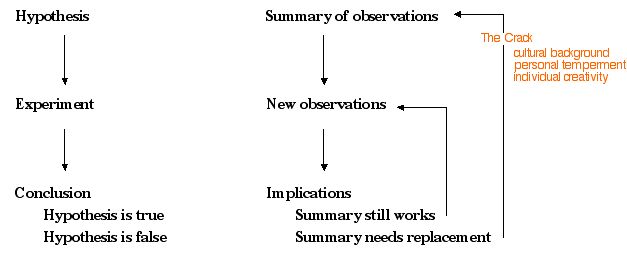Serendip is an independent site partnering with faculty at multiple colleges and universities around the world. Happy exploring!
EvoLit: A Work in Progress
Darwin Day Celebration - "An International Recognition of Science and Humanity"
Charles Robert Darwin - born 12 February 1809; published Origin of Species in 1859
Abraham Lincoln - born 12 Feburary 1809
Also born 1809: Edgar Allan Poe, Felix Mendelssohn, Nikolai Gogol, Alfred Lord Tennyson, Fanny Kemble
Also in 1809: James Madison succeeds Thomas Jefferson as US President, Robert Fulton patents the steamboat, first practical US railroad track (wooden, Philadelhia), Mary Kies first woman to receive a US patent, Ecuador declares independence from Spain, Napoleon attempting to conquer Europe, Goethe publishes Elective Affinities
- Evolution = a work in progress about work in progress? ... but first
- Science = ? and then
- Humanity= ? along with
- Humanities (eg literature) = ?
Empirical science as ... story telling and story revision, a work in progress
| Traditional linear view of science |
Loopy, story telling view of science |

|
|
| Science as body of facts established by specialized fact-generating people and process
Science as successive approximations to Truth
Science as discovery |
Science as work in progress, a process of getting it less wrong, potentially usable by and contributed to by everyone
Science as ongoing story telling and story revision: repeated making of observations, interpreting and summarizing observations, making new observations, making new summaries ... individually and collectively Science as skepticism, a style of inquiry that can be used for anything, one which everybody is equipped to to/can get better at/be further empowered by, and contribute to - a way of making sense of what is but even more of exploring what might yet be Science as creation |
|
| If science is as much about creation as discovery then the "crack"is a feature, not a bug ... and differences among people are an asset to the process rather than a problem or an indication it isn't working |
- Revisiting Science in Culture: Science as Story Telling and Story Revision
- Getting It Less Wrong, The Brain's Way: Science, Pragmatism, and Multiplism
- Thinking About Science: Evolving Stories
- Science as Story Telling in Action
- Science as Storytelling or Story Telling? A Conversation About Science Education ... and Science
- Paths to Story Telling as Life: Fellow Travelling with Richard Rorty
Trying out science as story ...
Which of the following two stories do you prefer?
- personal observations?
- observations made by others (personally verified or not)?
- social stories (heard from others)?
- usefulness?
- Very old
- Less old
- Recent
- Still more recent
- SeaWiFS Biosphere Globes
- Ask a Scientist
- Why it matters (sometimes)
Is one or the other story true? Have there been others? Will there be?
Which of the following two stories do you prefer?
Because of ...- personal observations?
- observations made by others (personally verified or not)?
- social stories (heard from others)?
- other?
- Older
- More recent: Ptolemy, Copernicus (1473-1543), Brahe (1546-1601), Galileo (1564-1642), Kepler (1571-1630)
- Integrating projectiles and orbits
- Recent and when it matters
- Which Way IS It?
Is one or the other story true? Have there been others? Will there be others?
Which of the following stories do you prefer?
- Existing life forms (including humans) are as they are because of a previous and ongoing process of evolution consisting of random change and natural selection (differential reproductive success).
- Existing life forms (including humans) are as they are because of repeated creative acts of a supernatural being with a plan and intent?
- Existing life forms (including humans) are as they are because of an initial creative act with a supernatural being with a plan and intent?
- Other?
- personal observations?
- observations made by others (personally verified or not)?
- social stories (heard from others)?
- other?
- is one or another story "true"?
Scientific stories are efforts to summarize the widest possible range of observations, always motivate new observations and hence new stories, should never be understood as "authoritative" or "believed in", do not compete with or invalidate other stories. Key issues about scientific stories
-
What observations do they summarize?
- In what context are they useful?
-
What new observations do they motivate?
If empirical science is story, then what is literature/fiction?



Comments
Serendip Pingback
[...] This page has been linked to from Belief and Skepticism | Serendip's Exchange
[...]
Post new comment